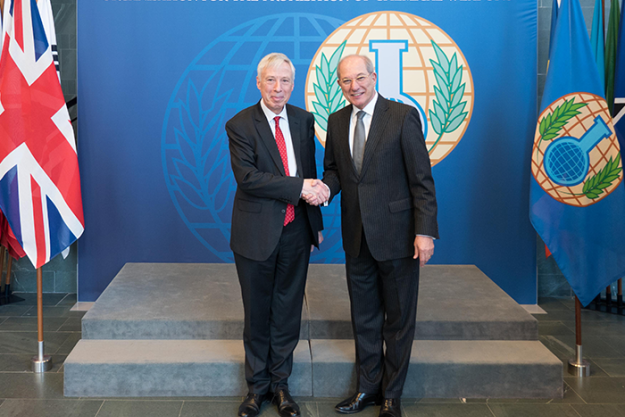
The OPCW Director-General, Ambassador Ahmet Üzümcü, meets the Minister of State for Defence for the United Kingdom of Great Britain and Northern Ireland, the Rt Hon Earl Howe
THE HAGUE, Netherlands — 14 February 2018 — The Director-General of the Organisation for the Prohibition of Chemical Weapons (OPCW), Ambassador Ahmet Üzümcü, met with the Minister of State for Defence for the United Kingdom of Great Britain and Northern Ireland, the Rt Hon Earl Howe, yesterday during a visit to OPCW Headquarters in The Hague.
Mr Howe was accompanied by the Permanent Representative of the United Kingdom to the OPCW, H.E. Mr Peter Wilson.
The Director-General and the Minister of State for Defence discussed the progress of the implementation of the Chemical Weapons Convention (CWC), OPCW’s continuing activities in Syria, initiatives to counter the use of chemical weapons by non-State actors as well as recent proposals to enhance the capabilities of the OPCW such as the expansion of the Laboratory and the establishment of the Rapid Response and Assistance Mission (RRAM).
The Director-General expressed his gratitude for the United Kingdom’s valuable support for OPCW’s work and the UK’s contributions to achieving a world free of chemical weapons.
Background
The United Kingdom (UK) joined the Chemical Weapons Convention in 1997.
As the implementing body for the Chemical Weapons Convention, the OPCW oversees the global endeavour to permanently eliminate chemical weapons. Since the Convention’s entry into force in 1997 – with its 192 States Parties – it is the most successful disarmament treaty eliminating an entire class of weapons of mass destruction.
Over ninety-six per cent of all chemical weapon stockpiles declared by possessor States have been destroyed under OPCW verification. For its extensive efforts in eliminating chemical weapons, the OPCW received the 2013 Nobel Prize for Peace.
